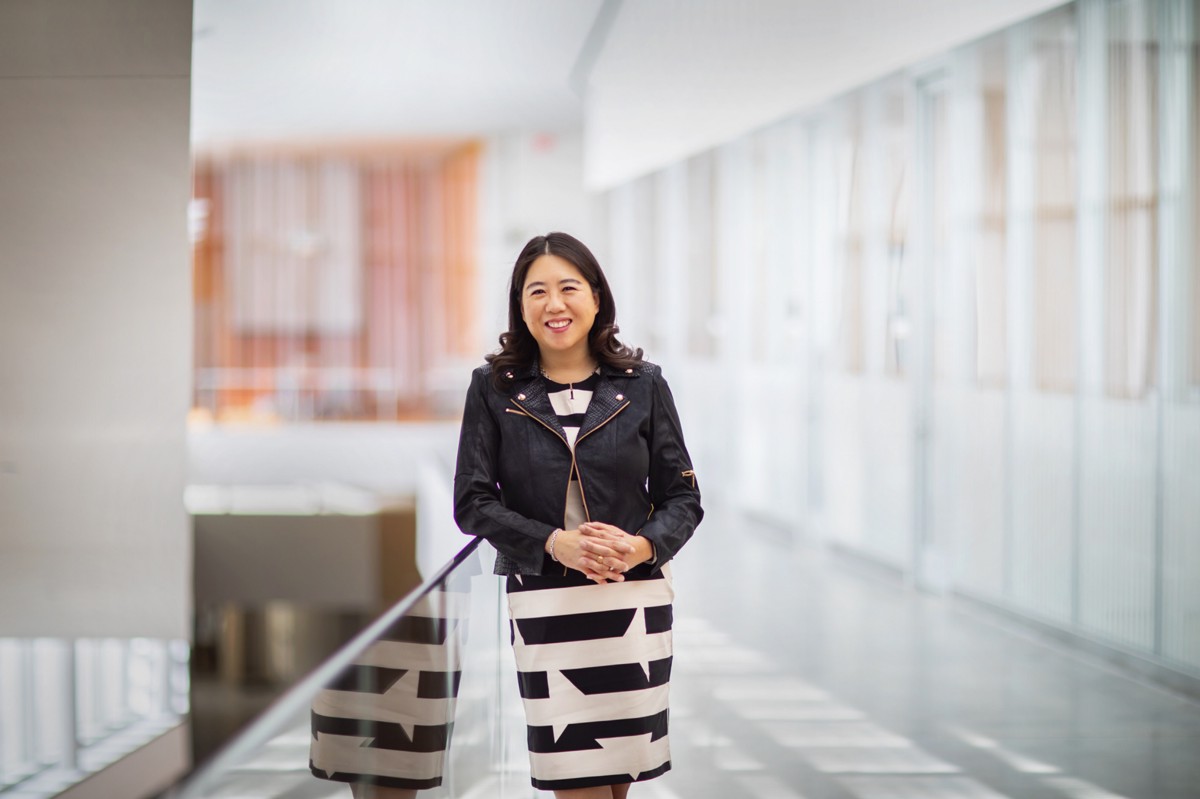‘If there were ever a box, Vanessa would be outside of it’
Vanessa Chan, a professor at Penn Engineering, is changing up the curriculum, giving students a real-world glimpse into life after college.

By Lauren Hertzler
Vanessa Chan is an entrepreneur and an angel investor. She’s a college professor and an inspirational speaker. She serves on boards by day, and bakes cakes with her daughters by night. And also manages to find time to knit.
“Once you become a working mom, you just get stuff done,” she says, laughing.
Chan, a professor of practice of innovation and entrepreneurship, and the undergraduate chair of the Materials Science and Engineering Department, has been teaching at Penn since the fall of 2017. She returned to her alma mater — she graduated with her bachelor’s in materials science in 1994 — after a full slate of accomplishments: earning her Ph.D. from Massachusetts Institute of Technology and pursuing a postdoc in Germany; working 13 years at management consulting firm McKinsey & Co., where she co-led its innovation practice and helped found its Philadelphia office; and creating her own business, Redesign Studio, where she invented Loopit’s stylish, tangle-free headphones.
What Chan brings to Penn, and the School of Engineering and Applied Science specifically, says Dean Vijay Kumar, is an important “real-world perspective” that’s shaking up students’ thinking — in the best kind of way. From incorporating soft skills into her teachings, to pairing students directly with mentors from industry, she’s making her mark on campus one day at a time.
“Vanessa is a remarkable individual,” says Kumar. “You cannot help but be impressed when you meet her. And if there were ever a box, Vanessa would be outside of it; she always has an interesting way of looking at problems, and brings a fresh perspective.”
Clear communicators
Chan, who was born in St. Louis, but spent most of her younger years in Hong Kong, has a sense of humor that beams, and a cleverness that’s palpable. She connects sharply with whomever she’s speaking with — and that’s intentional. In fact, it’s one of the various soft skills she incorporates into her classes, specifically Senior Design, a two-semester capstone program that challenges Materials Science and Engineering students to generate and execute original projects.
Soft skills, which, for one, allow people to work well with others, don’t come easy for everybody. Chan notes how she went all the way through graduate school without ever learning much about them.
“I had to learn the hard way at McKinsey,” she says.
Typically, at engineering schools, curriculum centers around perfecting the understanding of science and technology, with good reason. But those hard skills are almost useless in solving challenges if a person is unable to “communicate the big picture,” says Kumar. “Soft skills are an important part of who we are, how we innovate, and how we have an impact on the world.”
In fact, studies have shown that 85 percent of job success comes from having well-developed soft and people skills. A statistic Chan often refers to, she’s evolving the Senior Design curriculum as somewhat of a “finishing school,” she says, allowing students to focus on a team-based engineering project while developing presentation, communication, problem-solving, and self-reflection skills, as well as gratitude (a final course assignment expects students to write a physical thank-you card to someone who’s impacted their lives).
“Right now, I’m really excited about how we teach the next generation of engineers to be prepared,” says Chan. “I really want to empower engineers so they’re not just strong technically, which you absolutely are coming out of Penn, but also how prepared they are for the real world.”
Engineering ideas with impact
Another goal for Chan is to ensure materials science students have a strong awareness of technology commercialization — before they graduate from college.
“When I first graduated, I had no idea how things got sold,” says Chan, “and how you actually launch a new technology.”
One way Chan is doing this is requiring students to consider commercialization at the onset of Senior Design. Students are encouraged to focus on projects that address real-world problems, while understanding what the existing solutions for these problems are, and how their approach will be better.
This way of thinking benefited recent materials science graduates Emily Spencer and Gray de Simone. Winners of the overall Penn Engineering Senior Design Project Competition this past spring, the duo created kirigami envelopes for self-cooling buildings.
“Our project clearly fit into the world as it is now,” says Spencer, chatting on the phone from Seattle, where she’s interning this summer at Samsung. And, thanks to Chan’s class, “we were able to communicate that well.”
This year, notes Chan, is actually the first that the Materials Science and Engineering Department team took home the top prize, worth $800, in the competition. “It’s huge, great news,” she says.
Continue reading at Penn News.
